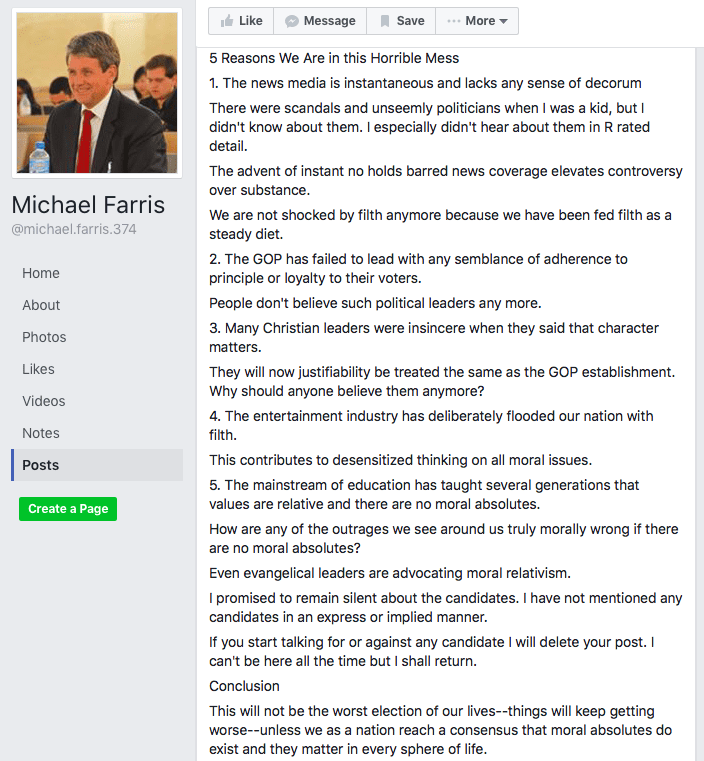I grew up a homeschooled girl in the evangelical Christian Right. Politically conservative, I attended anti gay marriage rallies as a teen and logged long hours campaigning for pro-life candidates. As an evangelical homeschool girl, I quickly heard rhetoric that positioned me—a homeschooled child—as the key to retaking the country for Christ. Our parents had taken us out of Egypt (the public schools) and were raising us in the wilderness (homeschooling), we were told, so that we could grow up to retake the promised land (i.e. make the country culturally evangelical and politically conservative). Michael Farris, who founded Patrick Henry College in 2000, was the most prominent homeschool leader using this rhetoric. I idolized him and was excited out of my mind to meet him when I attended a summer program at his university while in high school. So there you have it—background.
Farris is one of a dwindling number of Christian Right bigwigs to not endorse Donald Trump. It has become fairly clear that he is struggling with this, though. He recently described this election as “clearly the most awful in my life” and “the most confusing.” Still, though, no Trump endorsement. And yet, Farris’s reluctance to endorse Trump does not mean he necessarily understands progressive objections to the candidate. Far from it, as it would turn out.
Check out this Facebook status from earlier this month:

Let’s take this bit by bit, shall we?
5 Reasons We Are in this Horrible Mess
1. The news media is instantaneous and lacks any sense of decorum
There were scandals and unseemly politicians when I was a kid, but I didn’t know about them. I especially didn’t hear about them in R rated detail.
It appears that Farris is saying that in the past, politicians’ sexual scandals were kept on the down-low (like that was a good thing?), but that our news media has changed that and that’s bad. Look, I’m not completely happy with the media myself, but actually giving credence to sexual abuse allegations instead of sweeping them under the rug (see: Crosby) is not one of the things I’m upset with them for. Keeping things behind closed doors doesn’t mean they aren’t happening—shouldn’t Farris be more upset with people who sexually assault others than he is with the media for talking about it? I seem to remember something in the Bible about light dispelling darkness.
The advent of instant no holds barred news coverage elevates controversy over substance.
It looks like Farris is suggesting that sexual scandals are “controversy” that gets in the way of talking about “substance.” But I thought part of the point of the Christian Right’s argument was that the personal is political—that character matters? I get that there are important policy issues that should be discussed and that this election has often veered away from those issues. But I do happen to think that the way am man treats women (and thinks and talks about women) is worth discussing. It’s not just “controversy” because it actually affects “substance” in a very real sense.
We are not shocked by filth anymore because we have been fed filth as a steady diet.
Farris says we’re “not shocked by filth anymore” which is confusing, because if that were true Trump’s 2005 tape and the ensuing accusations wouldn’t have mattered to anyone, but they did. Besides, I have a problem with the use of the word “filth.” It groups those who would commit sexual assault together with those who sing songs with sexually explicit lyrics, those who sleep with their significant others before marriage, and those who wear clothing that is considered “sexually revealing.”
2. The GOP has failed to lead with any semblance of adherence to principle or loyalty to their voters.
People don’t believe such political leaders any more.
Hmm. I’m not going to disagree with this one.
3. Many Christian leaders were insincere when they said that character matters.
They will now justifiability be treated the same as the GOP establishment. Why should anyone believe them anymore?
I won’t disagree with this one either. It’s true.
4. The entertainment industry has deliberately flooded our nation with filth.
This contributes to desensitized thinking on all moral issues.
I am so confused here. As far as I can tell, the people making excuses for Trump after his 2005 tape were largely evangelicals and political conservatives. The people most upset by the tape were progressives, young people, and moderates. And I’m pretty sure that progressives, young people, and moderates follow the entertainment industry more closely than do evangelicals or political conservatives. And if we really were so “desensitized” on moral issues, why are so many Americans so outraged by Trump’s comments vis a vis sexual assault?
What’s really going on here is a conflict between two different moral systems. Farris is against sex outside of marriage and against anything that hints at sex (in songs, art, dance, etc.) because these things could lead to the sin of having sexual thoughts about someone other than your spouse. That is his approach to sex. My approach is based on consent—I am against the normalization of nonconsensual sex in our society, but I don’t have a problem with sexually suggestive songs, art, dance, etc., because I don’t believe that having sexual thoughts is sin or that sexual thoughts always have to be acted on. This is completely antithetical to Farris’s approach.
I’m upset with Trump because he admitted to sexually assaulting women and kissing them against their will. Farris’s concerns probably have more to do with Trump being a “ladies man” who has been unfaithful to his wives and has never tried to stay away from “sexual temptation” (i.e. he’s done things like running beauty pageants).
From where I’m standing, our cultural sexual ethics have improved over the past decade. There’s more understanding of sexual assault, of the dynamics of rape, and of the problems with things like catcalling than there used to be. There’s still a long way to go, but I see improvement and promise. Farris sees the opposite, because for him the measure of good moral ethics vis a vis sex has more to do with how much sex there is in music, art, dance., etc., than with anything that has to do with consent. Farris thinks he have morals and everyone else doesn’t, but what’s actually going on here is a conflict between two different moral systems.
5. The mainstream of education has taught several generations that values are relative and there are no moral absolutes.
How are any of the outrages we see around us truly morally wrong if there are no moral absolutes?
Even evangelical leaders are advocating moral relativism.
Oh, Farris. Why is it that so many conservatives think progressives don’t have moral absolutes? We do! Our moral absolutes are just different from conservatives’ moral absolutes! Sure, the way we talk about morals is more complicated than the way evangelicals talk about morals, but that’s a good thing, because morals are in fact more complicated than evangelicals want them to be. Still, things like consent, things like harm reduction, things like equality of opportunity, these things are moral touchstones progressives use to guide their actions and policy. Just because our absolutes are different doesn’t mean we don’t have them.
This will not be the worst election of our lives–things will keep getting worse–unless we as a nation reach a consensus that moral absolutes do exist and they matter in every sphere of life.
Farris thinks we’re dealing with a conflict between morals and not-morals. He apparently doesn’t realize that we’re having a conflict between two different moral systems—one that is anti-gay and against all sex that isn’t marital, and one that believes that consenting adults should be able to make their own choices about sex and about who they marry. I pick mine, thank you very much.
I do respect that Farris hasn’t endorsed Trump. I have several other conservative friends who haven’t either, and who have gained my respect for that. But even a cursory look at Farris’s Facebook page—or at the blogs of others who have refused to endorse Trump—provides a quick reminder that these individuals still hold beliefs and promote policies that are antithetical to a moral system based on consent or to the the creation of a society with equal opportunity and a comprehensive social safety net.
I have a Patreon! Please support my writing!















